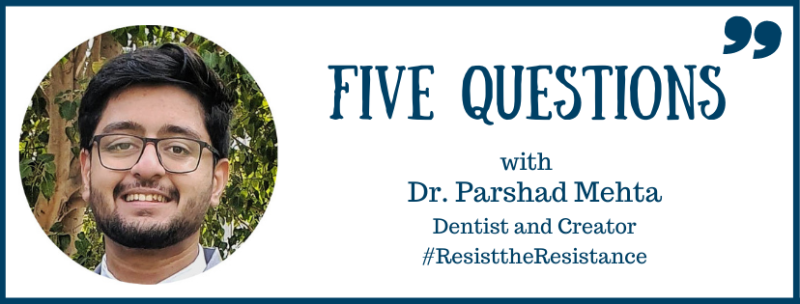5-Questions: Dr. Parshad Mehta
1. Will you please tell us about yourself and how you came to be passionate about antibiotic resistance?
I am Dr. Parshad Mehta, a Dentist from Ahmedabad, India. During the final year of my Bachelors' in Dental Surgery, I came across an online article about the threat of antimicrobial resistance and I started researching more on the topic. As I dug deep, I discovered that the problem is really serious and imminent steps are required to curb the problem, which in turn made me really inclined on the subject of antibiotic resistance. During the same time a friend of mine who was at that time in the department of Bioinformatics at Gujarat University was doing work in a similar area. So with the two of us sharing the same ideas along with a background which would help us, we went on overdrive to find a way to counter the problem.
2. You and your colleagues recently launched the "Resist the Resistance" public awareness campaign which looks pretty darn cool. Can you tell us about it and what you hope to accomplish?
I found out that the least that we as University students could do without much support was to initiate a public awareness campaign. Hence me and the same friend decided to launch 'ResistTheResistance'. He also enrolled a few people to help as volunteers. Our main goal was to spread the word out as much as possible to the people out there. The objective was to educate people about what problems arise due to improper consumption or lack of compliance regarding the antibiotic dosage. And how just with the consultation of a physician, the problems can be averted. We ultimately caught the attention of Gujarat University Botanical Society (GUBS) and they decided to join us in our efforts.
3. Is your campaign focused on people in Ahmedabad exclusively? Also, who is your target audience and how do you intend to reach them?
The campaign is not only for the people of Ahmedabad, and for that same reason we made a presence on social media so that the campaign is not bound by boundaries of a particular city or a region. During the later stages of the campaign, before the pandemic, we started to spread the word in the nearby city of Gandhinagar. Our primary targets were the general public and we found that the best way to reach them would be via the Hospitals and Pharmacies as usually people would get antibiotics only after a prescription. Hence, if a check was made on them and knowledge about the antibiotic resistance was imparted to them, then they would be able to directly advise the patients accordingly.
4. What else is happening in India to curb antibiotic use in people and food animals? How can organizations in the US (such as ours) help amplify the good work you are doing?
A lot of positive steps are being taken here in India to fight antibiotic resistance. The Ministry of Health and Family Welfare published a 5-year National Action plan in 2017 which outlines the priorities and implementation strategies for curbing AMR in India. Organizations like Indian Initiative for Management of Antibiotic Resistance (IIMAR), Indian Network of Surveillance of Antibiotic Resistance (INSAR) among others have come up to take a stand. The work being done at the Antibiotic Resistance Action Center is exemplary and commendable. Such big organizations can support the very small initiative programs by providing them a platform to have access to more people and help them in making their voice heard.
5. We ask this of all everyone we interview for our newsletter and on our podcast: what freaks you out most about antibiotic resistance? What gives you the most hope?
The really scary thing about antimicrobial resistance is that there might come a time if we are not careful, where even the smallest infections would result in septicemia or a septic shock because the bacteria causing the infections would be resistant to antibiotics. This problem might push us to an era where no antibiotics are effective, essentially bringing us back to pre-antibiotic times where people could die due to the slightest of infections. On the bright side though, there is a lot of research which is being conducted successfully to provide an alternative solution to antibiotics. Bacteriophages are one treatment modality having a potential use in resistance cases. Antimicrobial peptides are another promising prospect. With these and many more future research avenues I believe the menace of Antimicrobial Resistance can be curbed if we start acting on it right now.
Be sure to follow Dr. Mehta on social media:
Instagram: @resist_the_resistance
Twitter: @AntibioticGUBS
Facebook: @Resistance63


